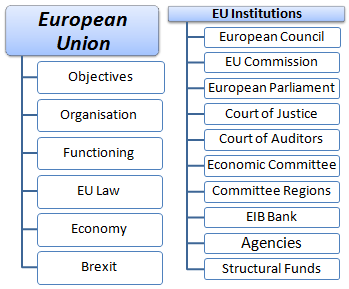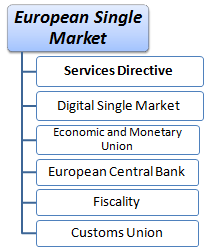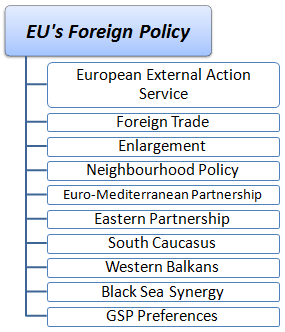European Economic Area (Western Civilization)

Economic Integration, European Economic Area. Christianity in Europe
- Introduction to the European Economic Area of the Western Civilization
- Influence of Christianity (Catholicism and Protestantism) on the European Economic Area
- European Economic Integration of the Western Civilization (Economic Organizations, Trade Agreements)
- The EU
- European Union: The largest single market in the World
- International relations of the EU
- The EU interactions with the other civilizations
- European Free Trade Association (EFTA)
- The case of the UK (BREXIT)
- The EU
- Other economic institutions in Europe
The aims of the subject “European Economic Area” are the following:
- To define the characteristics of the European Economic Area of the Western Civilization
- To analyze the influence of Christianity (Catholicism and Protestantism) on the European Economic Area
- To know the economic profile of the European Countries
- To understand the European economic integration processes of the Western Civilization
- To explore the economic relations with the other civilizations (Sinic, Hindu, Islamic, African, Buddhist) and the other areas of the Western Civilization (Latin America, U.S.)
- To analyze the main Economic Organizations related to the European Economic Area

The Subject “European Economic Area (Western Civilization)” belongs to the following Online Programs taught by EENI Global Business School:
Courses: Introduction to the EU, Christianity & Business.

Masters: International Business, Foreign Trade, Religions & Business.
Doctorate: Ethics, Religions & Business, World Trade.
Languages:  or
or  Civilización Europea
Civilización Europea  Civilization Europe
Civilization Europe  Civilização Européia.
Civilização Européia.
Why study “Christianity and Business”?.
- Credits of the Subject “European Economic Area”: 2

- Duration: two weeks
Download the Syllabus of the Subject “European Economic Area” (PDF).
1- Introduction to the European Economic Area of the Western Civilization
- Characterization of the European Economic Area
- Economic Profile of the region
2- Christianity in Europe.
- Catholicism in Europe
- Protestantism in Europe
- Anglicans
- Judaism and Agnosticism in Europe

3- European Economic Integration of the Western Civilization (Economic Organizations, Trade Agreements)
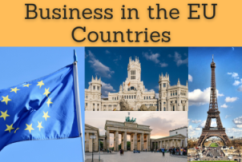
- Economic Profile of the European Union (EU) countries: Austria, Belgium, Bulgaria, Cyprus, the Czech Republic, Croatia, Denmark, Slovakia, Slovenia, Spain, Estonia, Finland, France, Greece, Hungary, Ireland, Italy, Latvia, Lithuania, Luxembourg, Malta, the Netherlands, Poland, Portugal, Romania, and Sweden
- Amancio Ortega, one of the richest men in the world
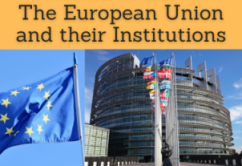
Institutions of the EU
- European Commission
- European Parliament
- European Council
- European Economic and Social Committee
- Court of Justice
- European Investment Bank
- Committee of the Regions
- Court of Auditors
- Decentralized Agencies
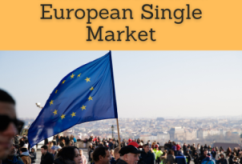
- European Single Market
- Services Directive of the EU
- Digital Single Market
- Taxation System
- European Economic and Monetary Union
- European Central Bank
- European Customs Union
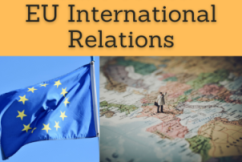
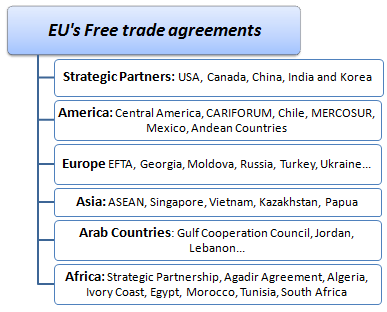

Interactions of the EU with the other civilizations.
- The EU with the other economic areas of the Western Civilization:
- Europe (Non-EU)
- European Economic Area (with the EFTA)
- Central European Initiative
- European Neighborhood Policy
- Latin America. Free Trade Agreements with the Andean Community, MERCOSUR, Chile, Mexico, Central America, and the CARIFORUM
- North America.
- The U.S.. Relationships between the EU and the U.S.. Future Agreement
- EU-Canada CETA Trade Agreement
- Europe (Non-EU)
- The EU with the African Civilization
- Africa-EU Partnership
- EU-Algeria Association Agreement
- Trade Agreements with Ivory Coast, Egypt, Morocco, Tunisia, South Africa, and Cameroon
- The EU with the Islamic Civilization
- Euro-Mediterranean Partnership
- Agadir Agreement
- EU-Turkey Customs Union
- Trade Agreement with the GCC, Jordan, Lebanon..
- The EU with the Orthodox Civilization:
- Relationships between the EU and Russia
- Trade Agreements with Georgia, Moldova, and Ukraine
- The EU with the Hindu Civilization:
- The EU with the
Sinic Civilization:
- Relationships between the EU and China
- FTA with South Korea
- Other Inter-Civilizations agreements:
- FTA with the ASEAN
- Asia-Europe Meeting
- The EU is an observer of the SAARC
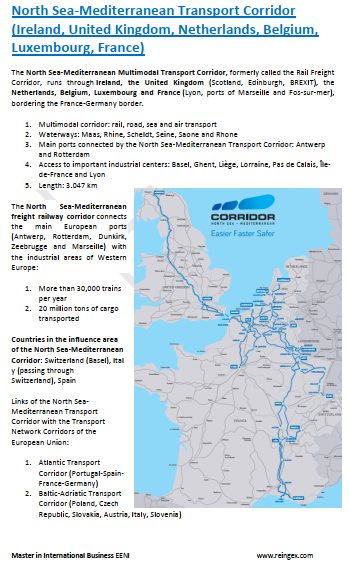
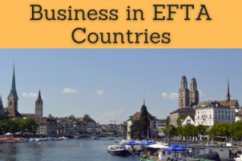
European Free Trade Association (EFTA).
- Economic Profile of the European Free Trade Association Countries: Iceland, Liechtenstein, Norway and Switzerland
- EFTA Free Trade Agreements
- Middle East: Gulf Cooperation Council, Jordan, Lebanon
- Africa: Egypt, Morocco, Tunisia, SACU
- Asia: Singapore, India, South Korea, the Philippines
- America: Canada, Colombia, Chile, Mexico, Peru, Central America
- Europe: Albania, Bosnia and Herzegovina, Georgia, Macedonia, Montenegro, Serbia, Turkey, Ukraine
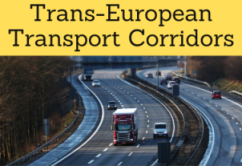
- Atlantic Corridor
- Baltic-Adriatic Corridor
- North Sea-Baltic Corridor
- North Sea-Mediterranean Corridor
- Mediterranean Corridor
- Eastern Europe-Eastern Mediterranean Corridor
- Scandinavian-Mediterranean Corridor
- Rhine-Alpine Corridor
- Rhine-Danube Corridor
- Strasbourg-Danube Corridor
- Pan-European Corridor II
- Pan-European Corridor IX
- Corridor Europe-Caucasus-Asia
- Afghanistan-Turkey Corridor (Lapis Lazuli)
- Islamabad-Tehran-Istanbul Rail and Road Corridor
- Trans-Caspian Corridor
Other Economic Institutions in Europe.
Map of the European economic integration of the Western Civilization.
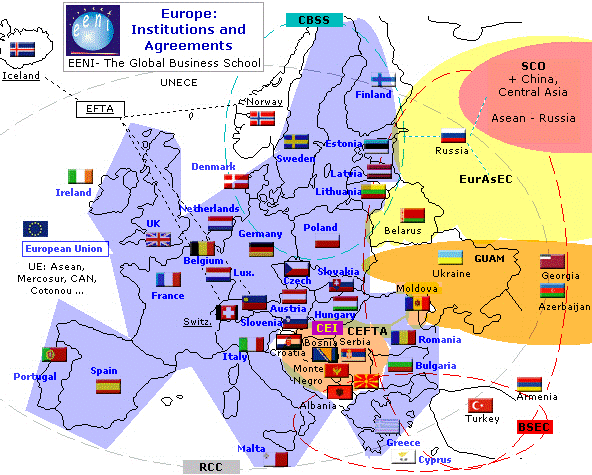
The Christian Countries (Catholic, Protestant, and Orthodox) mainly compose Europe.
The European Countries that are part of the European Economic Area of the Christian-Western Civilization:
- Member States of the EU with Catholic or Protestant majorities: Austria, Belgium, the Czech Republic, Croatia, Denmark, Slovakia, Slovenia, Spain, Estonia, Finland, France, Germany, Hungary, Ireland, Italy, Latvia, Lithuania, Luxembourg, Malta, the Netherlands, Poland, Portugal, and Sweden
- EFTA States: Iceland, Liechtenstein, Norway, and Switzerland
- The case of the UK (BREXIT)
- Other European Countries: Andorra, Monaco, and San Marino
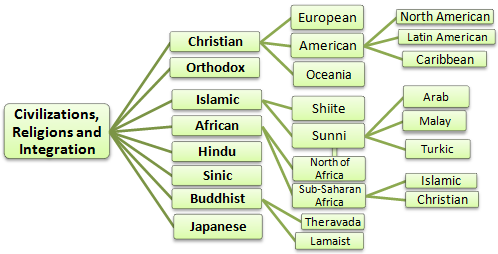
Germany is the Central State of the European Economic Area of the Western Civilization, while France and the UK (until Brexit) have a significant influence.
The EU is the largest trading bloc in the World (19% of the total world's trade).
The European Countries that are not part of the European Economic Area of the Western Civilization are:
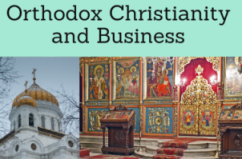
- Countries with Orthodox majorities of the EU (Bulgaria, Cyprus, Greece and Romania) are integrated economically in the European Area of the Western Civilization, but from a cultural, religious and historical point of view fit better with the Orthodox Civilization
- Other European Countries with Orthodox majorities (Armenia, Bosnia and Herzegovina, Belarus, Georgia, Moldova, Montenegro, Macedonia, Serbia, and Ukraine) and consider as a part of the Orthodox Civilization
- The European Countries with Muslim majorities (Albania -62% Muslim-, Azerbaijan, Turkey) consider them as members of the Islamic Civilization
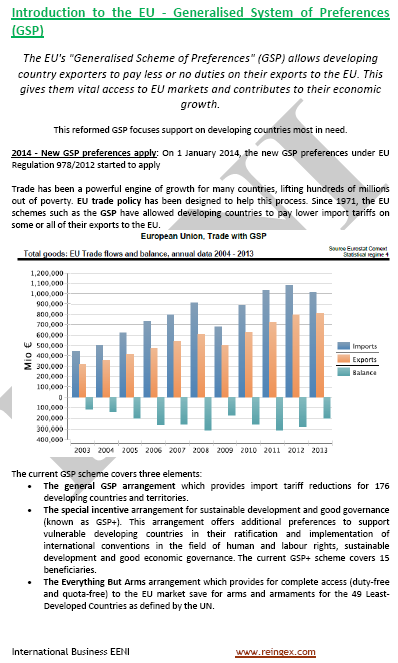
(c) EENI Global Business School (1995-2024)
We do not use cookies
Top of this page




